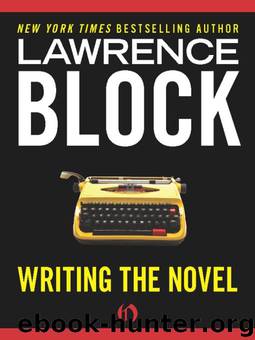Writing the Novel by Lawrence Block; Block

Author:Lawrence Block; Block
Language: eng
Format: mobi
Tags: Non-Fiction, Reference, Writing
Publisher: Open Road
Published: 1979-01-01T05:00:00+00:00
Chapter 8
Getting Started
Every novel has a beginning, a middle, and an ending.
I picked up this nugget of information when I first studied writing in college, and I’ve heard it restated no end of times since then. I pass it on to you because I’ve never been able to challenge the essential truth of the statement.
I’ve been trying to think of one solitary instance over the past twenty years when it’s helped me to know that a novel has a beginning, a middle and an ending. And I can’t come up with a one. I learned at about the same time that in 1938 the state of Wyoming produced one-third of a pound of dry edible beans for every man, woman and child in the nation, and that fact too has lingered in my mind for all these many years, and it hasn’t done me a whole hell of a lot of good either. But I pass it on, too, for whatever it’s worth.
A beginning, a middle and an ending?
Let’s start with the beginning.
Openings are important. In a more leisurely world—a couple of centuries ago, say—the novelist had things pretty much to himself. There was no competition from radio and television, nor were there very many other novelists around. The form was new. Furthermore, life as a whole moved at a gentler pace. There were no cars, let alone moon rockets. One took one’s time, and one expected others to take their time—in life or in print.
Accordingly, a novel could move off sedately from a standing start. A long first chapter might be given over to a thoroughgoing summary of events which we are told took place before our story gets underway. It is not uncommon to encounter a Georgian or Victorian novel in which the first chapter constitutes little more than an extended family tree; the story’s protagonist doesn’t even land in the cradle until Chapter Two.
Things are different now. Novels, crowded together like subway riders at rush hour, stand on tiptoe shouting “Read me! Read me!” They compete with each other and with the myriad other leisure-time activities clamoring for public favor. The reader, however prepared he may be for a long leisurely perusal, is not of a mind to spend a first chapter pruning a family tree. He expects a book to catch his interest right away; if it doesn’t, it’s the easiest thing in the world for him to reach for another.
“The first chapter sells the book,” Mickey Spillane says. “And the last chapter sells the next book.”
Spillane, I’m told, also claims to write a book’s final chapter first. His entire book is geared to build up to the impact of the finale, he theorizes, so he can best achieve a powerful climax by writing that last scene first, then writing the rest of the book as prelude, I can see the logic in this, but we’ll go with the premise for now that you’re going to write your book more or less in order, beginning with page one.
Download
This site does not store any files on its server. We only index and link to content provided by other sites. Please contact the content providers to delete copyright contents if any and email us, we'll remove relevant links or contents immediately.
And Here's the Kicker: Conversations with 21 Top Humor Writers on Their Craft by Mike Sacks(1044)
2120-2126 by Russell Fine(825)
2024-2120 by Russell Fine(776)
550 AP Calculus AB & BC Practice Questions by Princeton Review(691)
You Should Be Writing by Brenda Knight & Brenda Knight(691)
Letters to a young poet by Rainer Maria Rilke(681)
How Tell a Story and Other Essays by Mark Twain(671)
Reading for the Plot by Peter Brooks(662)
Poetics (Penguin Classics) by Aristotle(620)
Cultures and Beyond (The Art of World Building Book 3) by Randy Ellefson(585)
Improve Your Writing with NLP by Judith Pearson(578)
The Story Works Guide to Writing Point of View: How to harness the power of POV and write amazing narratives. (The Story Works Guide to Writing Fiction Book 2) by Winternheimer Alida(575)
Letters to a Young Poet (Rediscovered Books) by Rainer Maria Rilke(554)
Story Structure Architect by Schmidt Victoria Lynn(546)
Mastering the Process by Elizabeth George(541)
Odessa Stories by Isaac Babel(537)
The Hidden Writer by Alexandra Johnson(529)
Figure It Out by Wayne Koestenbaum(528)
Cracking the AP English Literature & Composition Exam, 2015 Edition by Princeton Review(528)
